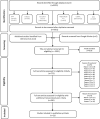Medical student wellness assessment beyond anxiety and depression: A scoping review
- PMID: 36301973
- PMCID: PMC9612562
- DOI: 10.1371/journal.pone.0276894
Medical student wellness assessment beyond anxiety and depression: A scoping review
Abstract
Background: A significant increase in distress and mental health illnesses has been identified in medical students during their training. As a result, medical schools have attempted to understand factors linked to well-being. Wellness questionnaires present a useful approach to identifying students with risk factors for mental health to provide appropriate resources for support and referrals. This study aims to identify validated questionnaires in the literature that measure medical student wellness.
Methods: A scoping review methodology was selected and an exhaustive search of MEDLINE, Embase, CINAHL, APA PsycInfo, EPIC, and Education Source, was performed from 1999 to May 27, 2021. A compilation of validated wellness evaluation tools, surveys and questionnaires assessing wellness beyond depression and anxiety was reviewed. All validated methods of wellness assessment for medical students were included.
Results: 5,001 studies were identified once duplicate records were removed. After applying inclusion and exclusion criteria, 23 articles were included in a qualitative synthesis and explored in detail. The following six validated questionnaires measuring the wellness of medical school students are reported and discussed: the Medical Student Stress Profile (MSSP), the Medical Student Stress Questionnaire (MSSQ), the Medical Student Well-Being Index (MSWBI), the Perceived Medical School Stress (PMSS), the Perceived Stress Scale for Medical Students (PSSMS), and the Oldenburg Burnout Inventory-Medical Student Version (OLBI-MS). These validated questionnaires provide various aspects to the assessment of wellbeing.
Conclusions: Wellbeing evaluations are reliable in identifying medical students who are at risk for mental health illnesses but must be chosen carefully based on contexts, academic environment and student population. A direct comparison between validated questionnaires for student wellbeing is not possible and individual medical schools must determine the appropriateness and validity of such tools based on population-specific characteristics and demands.
Conflict of interest statement
The authors have declared that no competing interests exist.
Figures
Similar articles
-
Evaluation of a Novel Wellness Curriculum on Medical Student Wellbeing and Engagement Demonstrates a Need for Student-Driven Wellness Programming.Teach Learn Med. 2023 Jan-Mar;35(1):52-64. doi: 10.1080/10401334.2021.2004415. Epub 2022 Feb 2. Teach Learn Med. 2023. PMID: 35107397
-
Exploring the Validity Based on Internal Structure of the Oldenburg Burnout Inventory - Medical Student (OLBI-MS).Teach Learn Med. 2023 Jan-Mar;35(1):37-51. doi: 10.1080/10401334.2021.2018695. Epub 2022 Jan 22. Teach Learn Med. 2023. PMID: 35068287
-
Exploring issues surrounding mental health and wellbeing across two continents: A preliminary cross-sectional collaborative study between the University of California, Davis, and University of Pretoria.PLoS One. 2020 Oct 23;15(10):e0241302. doi: 10.1371/journal.pone.0241302. eCollection 2020. PLoS One. 2020. PMID: 33095829 Free PMC article.
-
[Which interventions improve the well-being of medical students? A review of the literature].Encephale. 2020 Feb;46(1):55-64. doi: 10.1016/j.encep.2019.09.004. Epub 2019 Nov 22. Encephale. 2020. PMID: 31767254 Review. French.
-
Life skills programmes for university-based wellness support services for students in health sciences professions: a scoping review.BMC Med Educ. 2024 Dec 4;24(1):1418. doi: 10.1186/s12909-024-06162-y. BMC Med Educ. 2024. PMID: 39633387 Free PMC article.
Cited by
-
How COVID-19 pandemic and Ukrainian crisis shaped mental health services for medical students in Poland?BMC Med Educ. 2024 Oct 23;24(1):1201. doi: 10.1186/s12909-024-06224-1. BMC Med Educ. 2024. PMID: 39443982 Free PMC article.
-
Mental Health and Resilience in Nursing Students: A Longitudinal Study.Int J Environ Res Public Health. 2025 May 6;22(5):735. doi: 10.3390/ijerph22050735. Int J Environ Res Public Health. 2025. PMID: 40427851 Free PMC article.
-
A cross-sectional study on personal values of medical students: the differences from their instructors, their associations with mental wellbeing, and the influences of gender.BMC Psychiatry. 2024 Apr 12;24(1):272. doi: 10.1186/s12888-024-05695-2. BMC Psychiatry. 2024. PMID: 38609919 Free PMC article.
-
An examination of levels of depression, the probability of suicide, and autistic traits in medical faculty students: A cross-sectional study.Medicine (Baltimore). 2024 Nov 15;103(46):e40607. doi: 10.1097/MD.0000000000040607. Medicine (Baltimore). 2024. PMID: 39560525 Free PMC article.
-
A scoping review of well-being measures: conceptualisation and scales for overall well-being.BMC Psychol. 2024 Oct 23;12(1):585. doi: 10.1186/s40359-024-02074-0. BMC Psychol. 2024. PMID: 39443963 Free PMC article.
References
-
- Official records of the World Health Organization: United Nations, Interim Commission; 1976.
-
- Kötter T, Fuchs S, Heise M, Riemenschneider H, Sanftenberg L, Vajda C, et al.. What keeps medical students healthy and well? A systematic review of observational studies on protective factors for health and well-being during medical education. BMC Medical Education. 2019;19(1):94. doi: 10.1186/s12909-019-1532-z - DOI - PMC - PubMed
Publication types
MeSH terms
LinkOut - more resources
Full Text Sources
Research Materials


